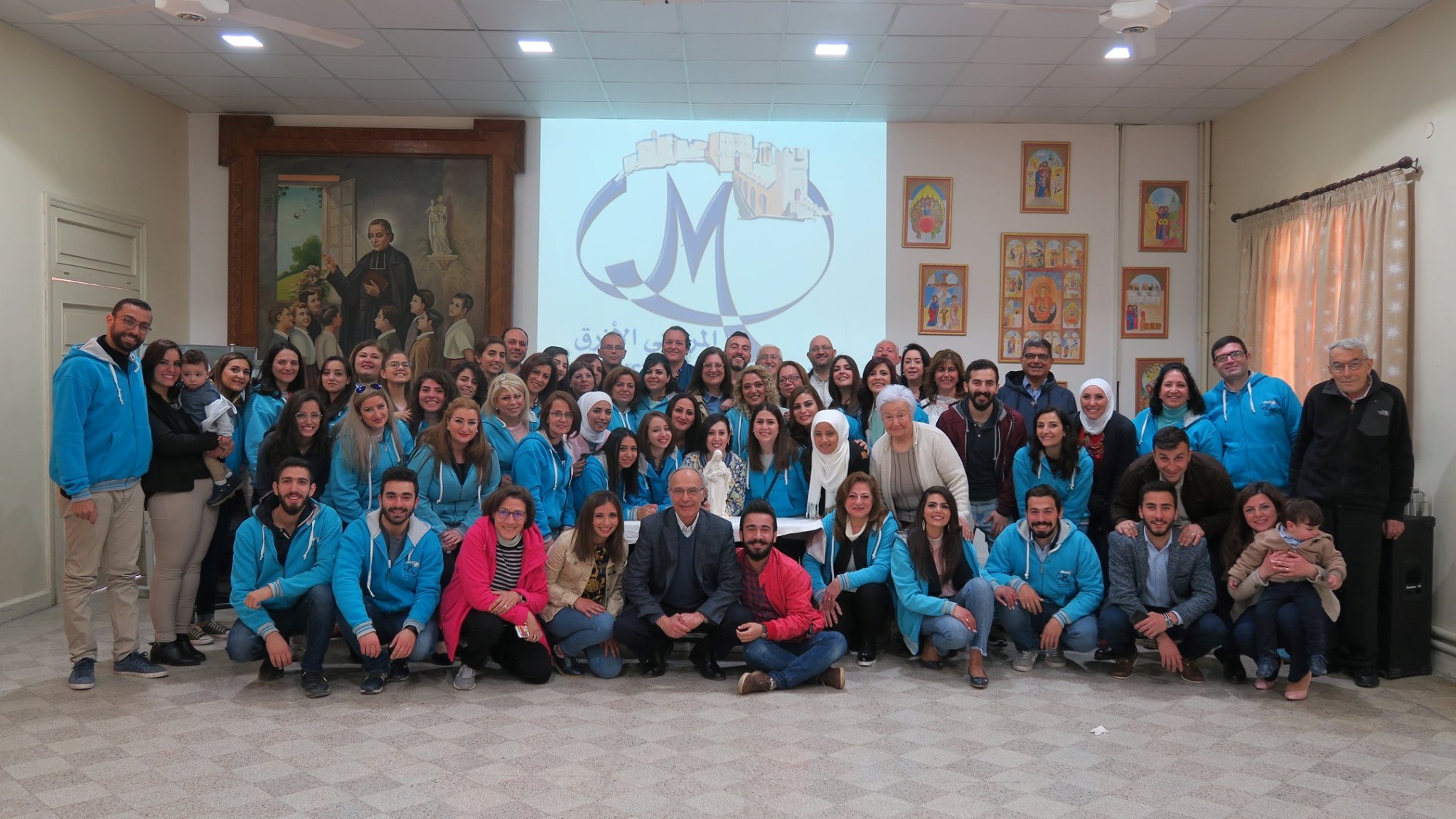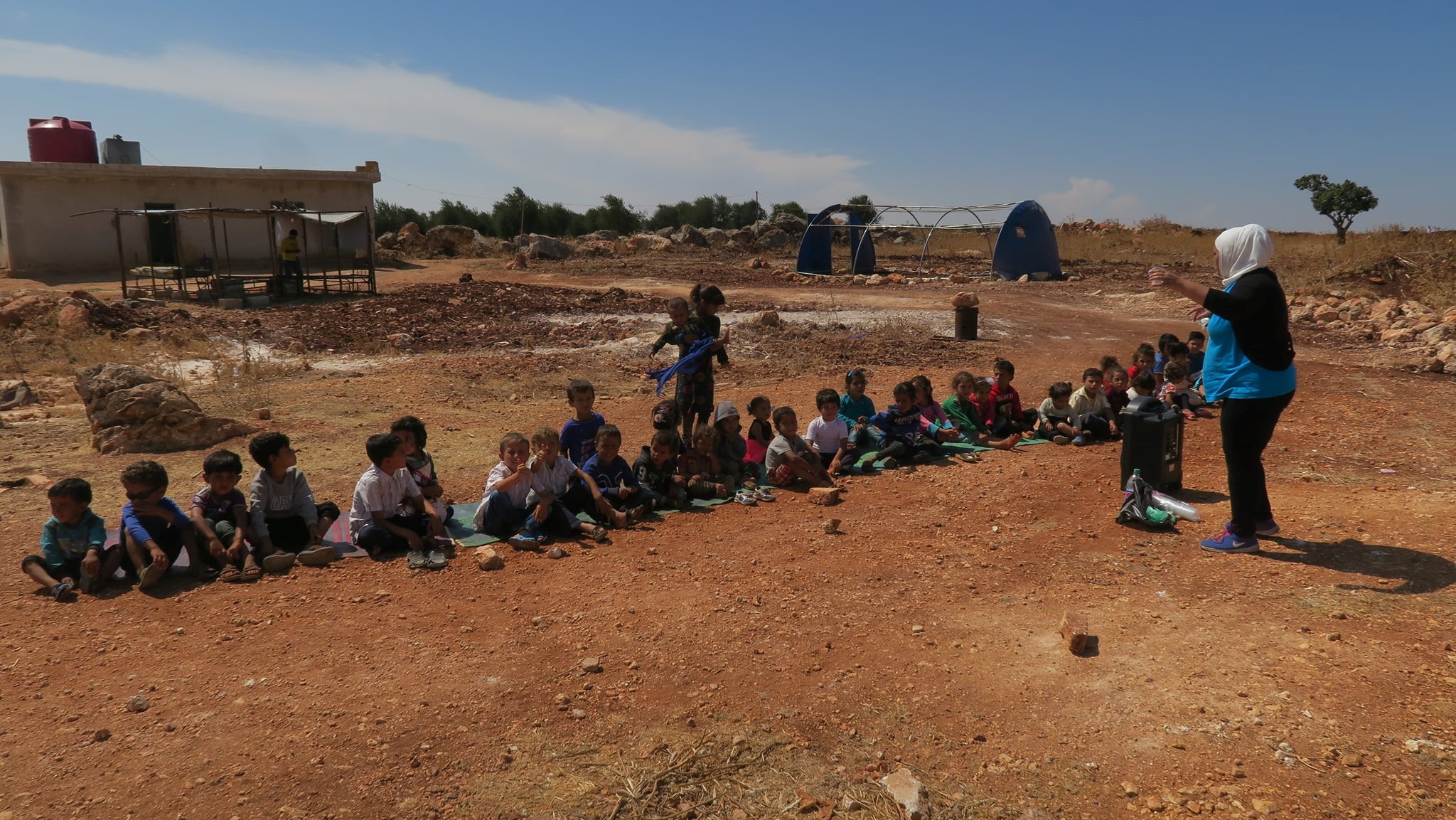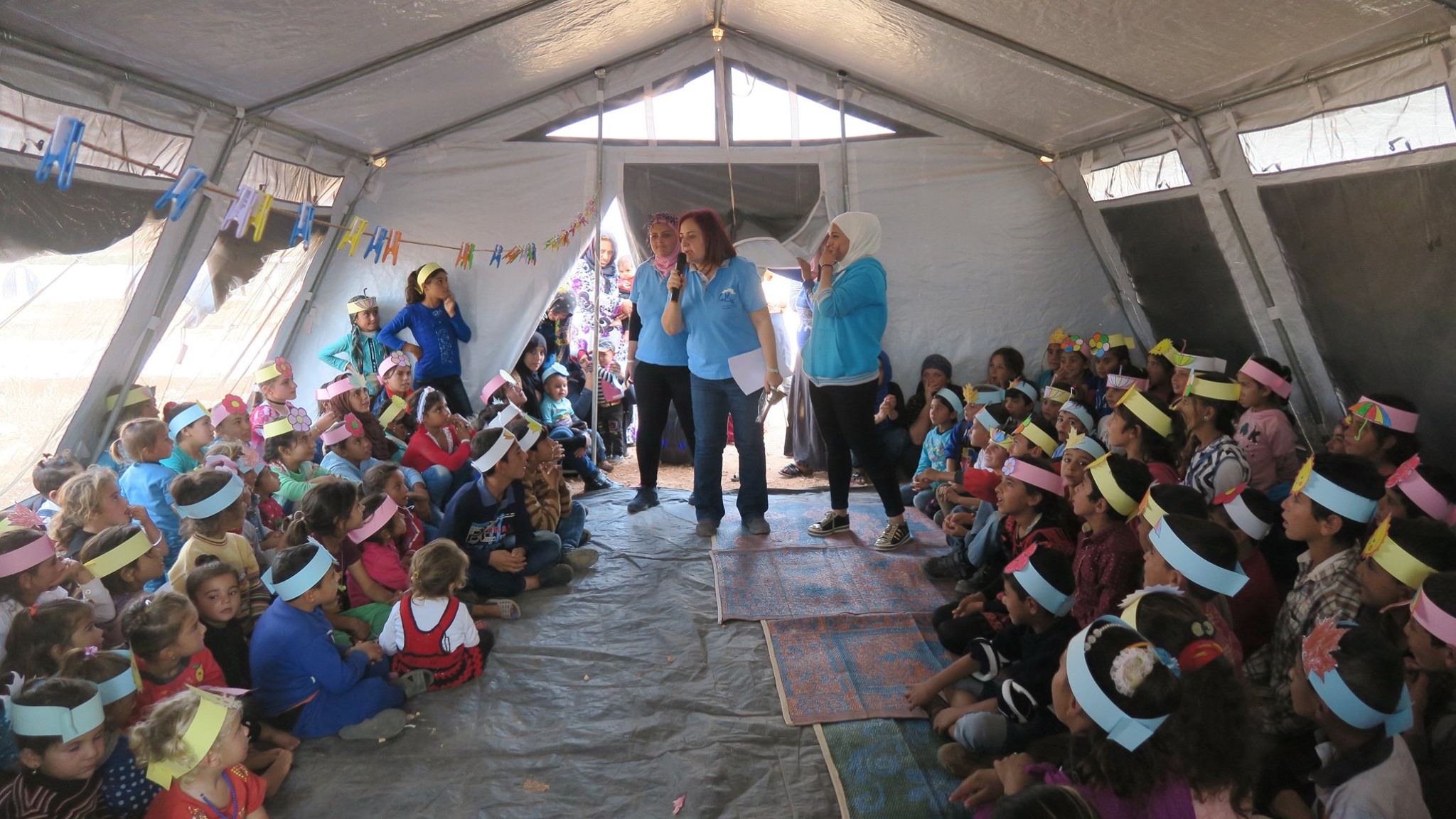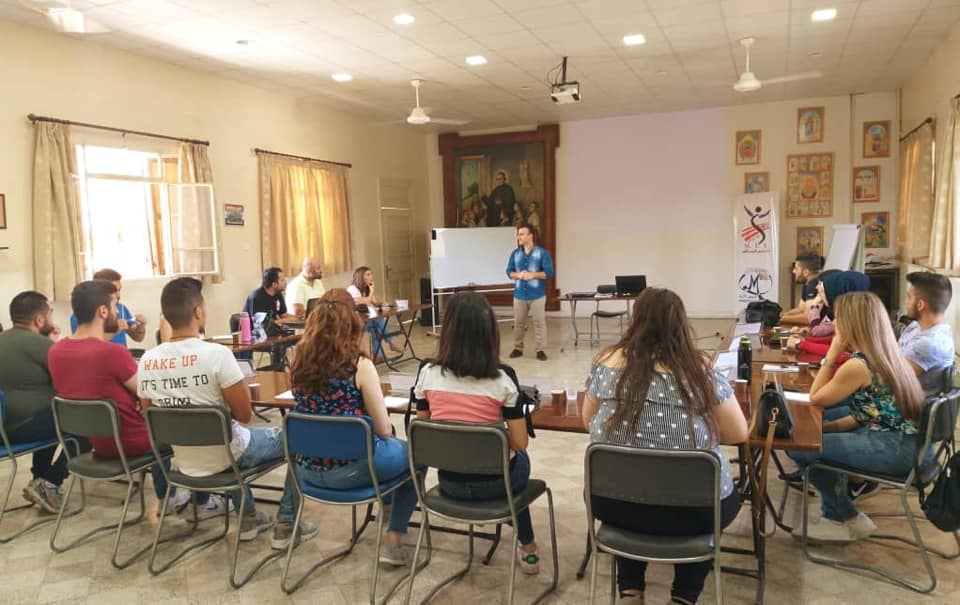
The true «peace spring»
Since the Turkish offensive against Syria almost a month ago, we have been receiving messages every day from our friends asking about our news and inquiring about what is happening. I will, therefore, try to briefly summarize a very complex situation. I will begin by sharing the context before the 9th of October, and then talk to you about the latestdevelopments.
Current situation in Syria
Since a year and a half, there has been almost no fight in Syria. We lived in a state of "neither war nor peace", a prolonged status quo. The Syrian government controlled 70% of the territory including the main cities. However, 3 areas remained occupied, which had to be liberated and the situation was frozen. A big part of Northeastern Syria, about 25% of territory, with Turkey to the North and Iraq to the East (which contains the main oil fields) was occupied by the Kurdish militia (YPG), supported by the Americans (and the French) who, apart from their unlawful/illegal presence, trained, armed and financed the Kurds. This militia, formed from Syrians of Kurdish ethnicity, thought they could be taking advantage of the chaos of war to create a Syrian Kurdistan or an autonomous region.
Another small part of Syria in the Northwest (the Afrin region), also inhabited by Kurdish Syrians had been occupied by the turkish army in January 2018, pushing nearly 140,000 people to leave.
Finally, the province of Idlib has been occupied for several years by the Islamists of front Al Nosra including tens of thousands of foreign terrorists.
On the other hand, the political situation has been a status quo. The Geneva talks were long dead and buried, replaced by Astana and Sochi meetings under the auspices of Russia, Turkey and Iran who were arranging the cease-fires and were trying to form a joint committee to draft a new constitution.
Syria, Turkey and the Kurds
To go back to October 9th, it must be pointed out that since the beginning of the war in Syria, Turkey had its eye on the Syrian Kurds who live mostly in the neighboring cities of the turkish border and have benefited of the war in other parts of Syria to take control of the Northeastern part of Syria. That provoked the ire of the Turks who did not want an autonomous kurdish region in Syria that could give wings to the kurdish independence activist movement in Turkey and his militia, the PKK. I must emphasize that the Kurds represent 25% of the turkish population and live in the southern regions, near the Syrian border. Many times, in the past, Turkey has threatened to invade those regions held by the YPG and was holding back because of American threats.
On October 9, after President Trump announced the withdrawal of the American troops from Syria (in fact, they have only moved further south in Syria), Turkey launched its operation "Peace Spring" (SIC), and invaded illegally Syria. The offensive is preceded by air raids on the main cities (Kamichli, Derbasiye, Ras Al Ayn, Ain Arab) of that region, inhabited by Syrian Kurds, Christians and Muslims, causing a massive exodus of people to other cities in the region. Kurdish fighters of the YPG, abandoned by the Americans, begged the Syrian army to come to their rescue reaffirming their Syrian citizenship and their attachment to the Syrian government and fleeing to the South while leaving the field free to the Turks. After 5 days of fighting, a ceasefire is negotiated by Turkey and Russia stipulating that all kurdish fighters should move 35 km away from the borders, that the Syrian army could return and restore the authority of the state, and that Russian-Turkish mixed patrols would control the border. Since then, the situation is frozenagain.
Everything happened as if the script was written in advance. The Turks got what they wanted: a security zone in Syrian territory 35 km deep where the kurdish military presence is prohibited. The Syrian government is the big winner having recovered, without fighting, a large part of the territories it no longer controlled since the beginning of the Syrian crisis and showing Turkey that it is in its interest to stop supporting Islamist terrorists and restore normal relations with Syria. The Russians have demonstrated their influence which has become considerable. The Americans keep control of Syrian oil wells and reconcile with Turkey, as the US support for kurdish fighters was the main source of contention between them. And the Kurds, like many times in the past, were fooled, used for 3 years by the Americans to weaken the Syrian government and fight Daesh, and abandoned when their godfather has decided so. Yet, many political actors had warned them from this possible outcome, and that it was in their interest to stay in the arms of the Syrian State.
Almost concomitantly, the Syrian Constitutional Committee, created on September 23 after endless negotiations, held its first meeting on October 30 in Geneva.
Nobody expects quick results, as the conditions for the adoption of different articles of the new constitution are difficult and require almost the unanimity of the 150 members of the commission.
Regarding the region of Idlib, the Syrian army had launched several offensives to liberate it from the islamist terrorists, but, at every attempt, it had to stop the offensive as a result of the pressure from Western powers who, to prevent a victory of the Syrian government, announced their fear of a possible humanitarian crisis.
Exactly, as they did when Aleppo was liberated 3 years ago. However, during the last offensive, the armed rebels had to back up 10 km to the North; which put out of the reach of their canons the 2 Christian cities from the region of Hama, Mhardé and Squelbiyé. These 2 cities were bombed for the last two years by Idlib’s terrorists and have undergone several sieges. You should have seen the inhabitants of these two cities cheering in the streets showing their relief and their joy.
The situation in Aleppo
In Aleppo, the situation is stable. Essential services are provided, water 5 days per week and electricity 18 h a day. University and schools are back to their normal schedule. The armed rebel groups, settled in the western suburbs, continue to send, occasionally, shells to Aleppo. Recently, a shell fell 200 meters from the St Louis Hospital and my office, and caused the death of a person and wounded several.
The economic crisis is very acute with an impressive unemployment rate, a very high cost of living, a galloping inflation and increasing poverty.

The Blue Marists’ projects
We, the Blue Marists, continue all our projects to help the poor and/or displaced families, with increasing difficulties to get funding.
We still take care of the refugee camp "Shahba" for displaced from Afrin despite the danger. The camp is 55 km from Aleppo and only 3 km from the Turkish army lines. Very often, shells fall near the camp. This does not prevent us from going there twice a week to distribute food and sanitary products, treating the sick, teach and educate children and adolescents, and train the adults. To see the joy in the children's eyes and sow some hope in the people's hearts are for us a great satisfaction.
The children of our 2 educational projects ("Learn to Grow" with 65 children and "I Want to Learn" with 110 children from 3 to 6 years) have started again in October. There is a very strong demand from parents to register their kids with us; since, in Syria, preschools are privately paid out of pocket as opposed to the free elementary public school, and the parents of our families simply cannot afford to pay. We are at our maximum capacity because of the small size of our establishments. The children, exuding happiness, are accompanied by 24 instructors.
Our psychological support program, Seeds, has grown a lot this year due to the high demand. In addition to support the children and adolescents who benefit from our various projects, two new groups of children and adolescents are being taken care of. The Seeds team has grown and they are now about twenty counselors under the direction of apsychologist.

We continue our program of "Micro-Projects" to give jobs to the adults, to allow them to live from the fruits of their labor with dignity and to fight emigration. In 2019, we organized four 48-hour training sessions during which we taught 75 people how to create and manage a new project, and we have funded 45 projects that will allow 80 families to get out of poverty and become independent from the NGOs support for living. We consider that helping people to have a job is the priority in the currentcircumstances.
Our project "Heartmade" for making women's clothing from leftovers fabric has taken off and is developing. It helps in finding a job for women, to develop their skills, their creativity and their sense of beauty, and in respecting the environment by fighting the waste of fabric and clothing by producing unique "handmade" pieces. We installed in our workshop solar panels to provide electricity to the sewing machines and rented a shop for sell our products. Eleven women work in this project helping to support 11 families, and we intend to develop this project and hire new people.
All of our other projects are about helping families live and grow. "Drop of Milk" distributes milk to 2900 children under 11; Two hundred displaced families are helped to be able to live in an apartment until they can go home; our medical program supports the medical or surgical expenses of about 150 patients per month; In our adult training center“MIT” we organize 2 sessions of 3 days of training per month for 20 adults each session; thirty women participate each week at the women's development sessions. All the sessions of our "Cut and Sew" project are full as well as for the Hope project for foreign language education.

The true "Peace Spring"
With our 85 volunteers and employees, we serve the poor and/or displaced families of Aleppo who consider us the true " Peace Spring ". We try to help them live with dignity, to accompany them financially and psychologically and to show them an active presence and solidarity. Yet, all we do is just a few drops in the ocean of the needs of the people. In previous years, we were able to find the necessary funding more easily. The sources are drying up but the needs are still there until peace is established.
Indeed, if the war is coming to an end, peace is not there yet. After eight and a half years of an absurd and atrocious war, it is time for the Syrians to be able to live normally like any other citizen in the world.
With this hope in the heart, I thank you, dear friends, for your friendship, your solidarity and your support and send you greetings from all our team.
_________________
Aleppo, November 17, 2019
Nabil Antaki on behalf of the Blue Marists
PS: The violence persists. The Christians Syrians are mourning. Monday, November 11, a Catholic priest and his father from Kamichli were assassinated on their way to Deir Elzor to support their parishioners. The same day, two car bombs exploded close to the Chaldean church in Kamichli.
